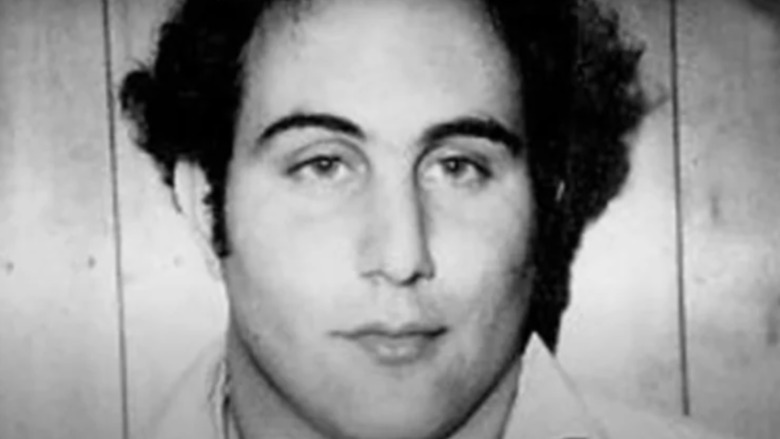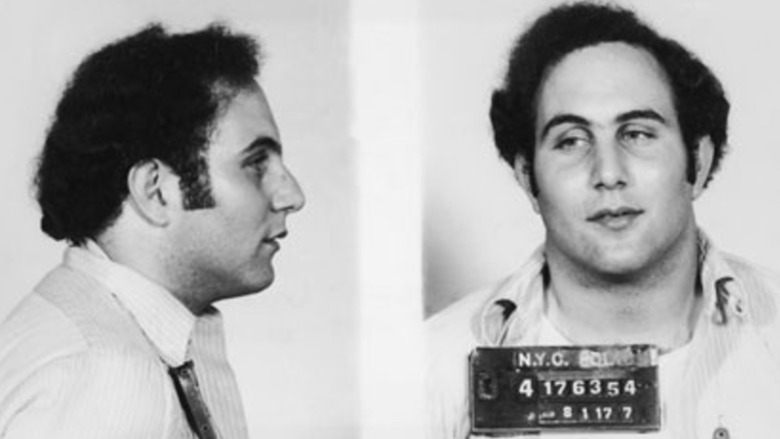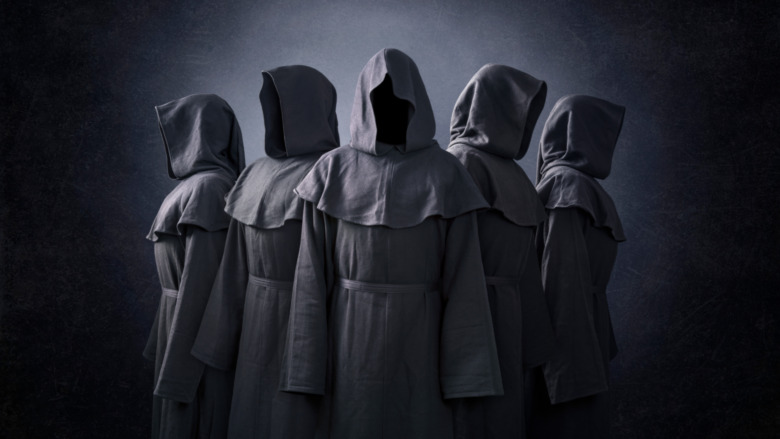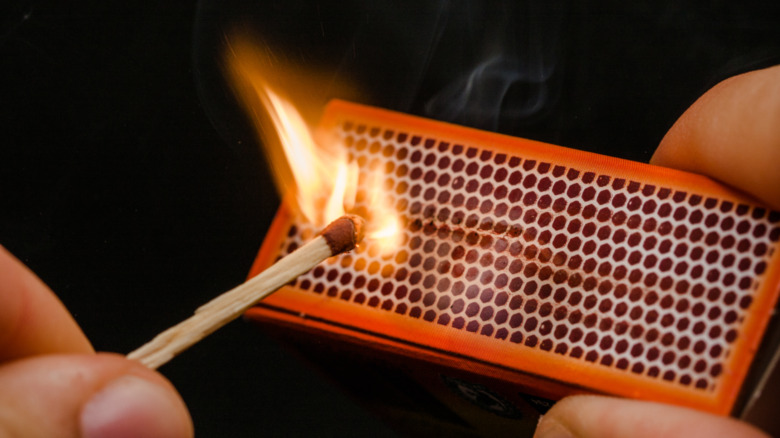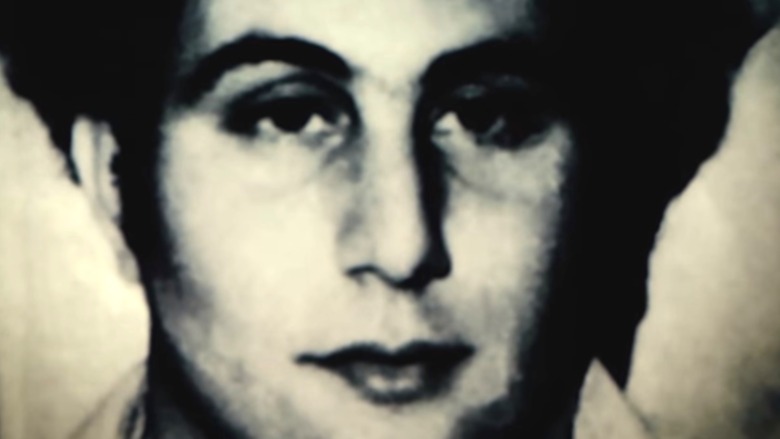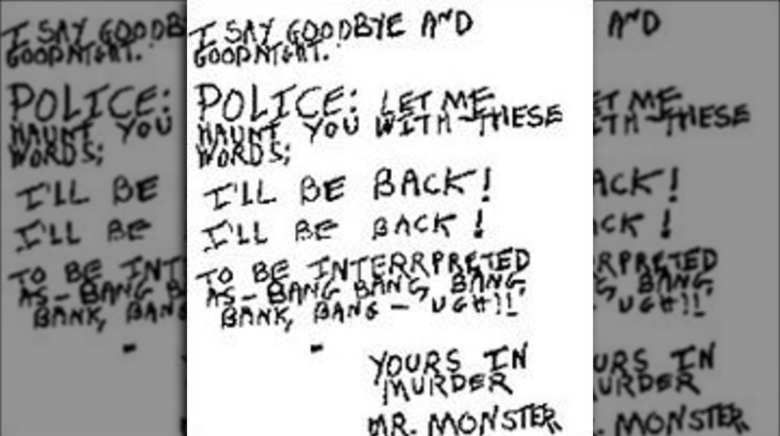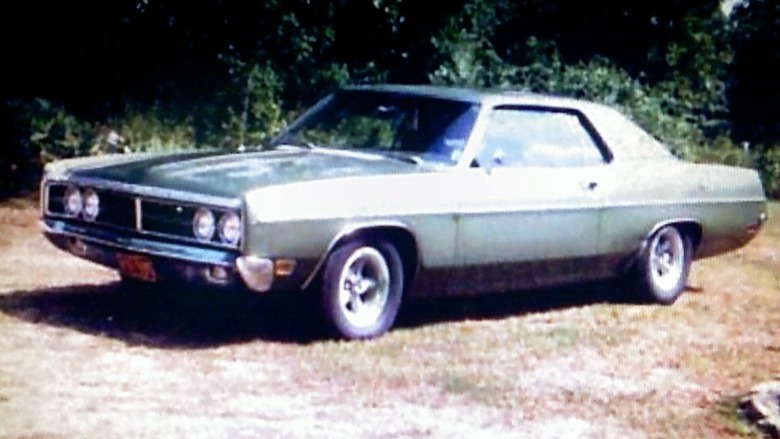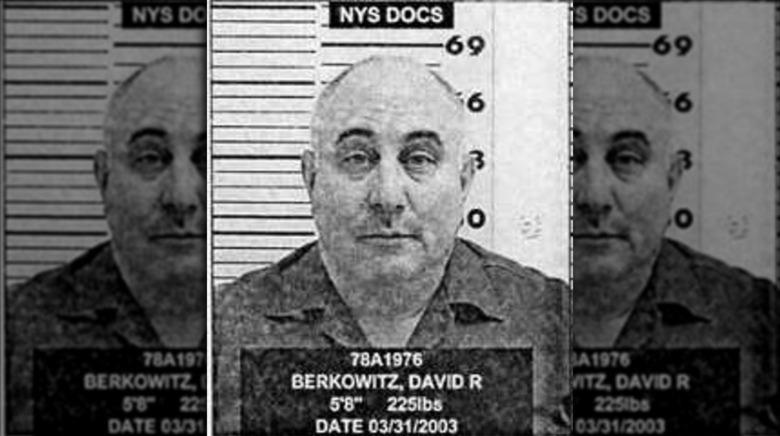The Untold Truth Of Son Of Sam
David Berkowitz wasn't the most prolific serial killer, nor the most creative. And yet he managed to put almost every living person in New York City into a state of sheer terror during the so-called "Summer of Sam" in 1976. Killing people seemingly at random and sending insane letters to the police and the press, Berkowitz was initially labeled the .44 Caliber Killer by the press, referring to the gun he used. But when the police found a letter left near one of his victims in which Berkowitz called himself the Son of Sam — Sam apparently being an ancient spirit possessing the body of his neighbor's dog and commanding him to kill — Berkowitz had a new, terrifying name and persona.
Sentenced to six consecutive life sentences totaling 547 years, Berkowitz has survived attempts to murder him in prison and remains among the living, though he'll likely never see the outside again. At the time, Son of Sam seemed to encapsulate the violent decline of large cities like New York, the sense that the center could not hold and that everything was spinning into chaos. But his legacy haunts us all today, whether we realize it or not. Here's the untold truth of Son of Sam.
Son of Sam killed six people between 1976 and 1977
The 1970s are further in the past than they sometimes seem — it's been more than 40 years since Son of Sam terrorized New York City. The reason his name still inspires fear and unease is because of the atmosphere in New York at the time and the way he approached the business of serial murder.
As noted by the New York Daily News, New York City in 1976 was in grim shape. It had seen 1,800 murders in 1975 alone, and economically, it was in shambles — the Daily News' infamous "FORD TO CITY: DROP DEAD" headline came in October of that year after the president stated he would veto any federal aid for the struggling city. And just a year later, the devastating blackout of 1977 would bring chaos to New York.
David Berkowitz, a lonely, mentally unstable young man, lived alone in Yonkers. Delusional and violent, he was tormented by the urge to hurt people, especially women. Beginning in 1976, he began giving in to those urges and killed five women and one man (Donna Lauria, Christine Freund, Virginia Voskerichian, Valentina Suriani, Alexander Esau, and Stacy Moskowitz) over the course of 12 months. As Oxygen notes, the casually random attacks combined with the terrifying name "Son of Sam" sent the city into a panic. There was a sense that anyone could be shot to death, anywhere, at any time.
Son of Sam had a type
David Berkowitz was one of those chatty serial killers who enjoyed spreading fear — and tormenting the police. During his year-long rampage, Berkowitz left rambling, deranged letters at the scenes of several of his crimes and sent letters to the police and to journalists, offering bizarre pronouncements and terrifying details. As the investigation stretched on for weeks and months without result, a real sense of panic settled on the city. As History.com notes, when one of Berkowitz's victims was killed when leaving a Queens disco, people stopped going out to restaurants and nightclubs, leaving them desolate and empty at the height of the disco craze.
And as Esquire reports, when the fact that Berkowitz targeted young women with long, dark hair was publicized, it resulted in a spike in wig sales as women scrambled to avoid Son of Sam's preferred victim profile. When wigs weren't an option, many women opted to cut their hair or simply dye it in order to feel safe. The pressure to end the city's collective nightmare became so insistent that the New York Police Department launched what The New York Times describes as "the largest manhunt in New York City history up to that time."
Son of Sam might not have acted alone
When David Berkowitz was arrested for the Son of Sam murders on August 10, 1977, it seemed very clear that these horrific crimes were the work on a single deranged individual. Berkowitz was found with the murder weapon in his possession, confessed to the crimes almost immediately, and offered zero alternative explanations to the evidence against him.
But as Rolling Stone reports, some people don't think Berkowitz acted alone. Journalist Maury Terry published a book in 1987 that claimed Berkowitz was part of a larger cult — and that there were other "Sons of Sam" out there who were never caught.
As New York Magazine explains, Terry believes Berkowitz suffered from crushing loneliness, and an invitation to take part in a ceremony with the Process Church of the Final Judgment — a satanic cult that Oxygen tells us had connections to Charles Manson — brought him into their clutches. Berkowitz supposedly leaned into the cult pretty hard, engaging in arson and animal sacrifice — and eventually committing murders on the cult's orders.
What's really crazy about this theory is that there's some reason to believe it. Several people suspected to have been part of the cult died mysteriously shortly after Berkowitz's arrest, and even one of the district attorneys working the case in 1977 believed Berkowitz acted with partners. Some believe the police pushed the "lone gunman" theory because they feared the city was on the edge of total panic and wanted to close the case quickly.
Son of Sam claimed his neighbor's dog ordered him to kill
Chances are no matter your age or background, you're familiar with the name "Son of Sam" and probably know to associate it with a terrifying serial killer. But why was a guy named David called Son of Sam? Trust us when we say the explanation will make you no less terrified.
As New York Magazine explains, Berkowitz was initially called the .44 Caliber Killer by the press due to the ammunition he used in the killings. But when Berkowitz left a crazy, rambling letter behind with one of his victims in which he wrote in part, "I am a monster. I am the 'Son of Sam.' ... Sam loves to drink blood. 'Go out and kill' commands father Sam," he received his new name.
As Oxygen notes, things got even stranger when Berkowitz was arrested. In explaining the name, Berkowitz claimed that Sam was the name of a 6,000-year-old spirit possessing a neighbor's dog. Sam commanded him to kill, communicating through the dog. This explanation did not exactly make anyone feel better about David Berkowitz.
But as The New York Times reports, Berkowitz later retracted the story and admitted he'd made it up. He claimed he was trying to ruin a deal his former lawyers were putting together for a book and film about his crimes, and in the hopes of convincing court-appointed psychiatrists that he was unfit to stand trial — which he almost succeeded in doing.
Son of Sam was probably also a prolific arsonist
When you think of David Berkowitz and Son of Sam, you obviously think of a mentally disturbed serial killer who terrorized New York City for a year between 1976 and 1977. But Berkowitz was more than just a killer — he was a one-man wrecking crew apparently determined to destroy the city he called home.
For years, someone had been setting fires in the Bronx in New York City — in untended brush, in abandoned cars, even in empty buildings. And according to the The New York Times, there's reason to believe the arsonist dubbed the "Phantom of the Bronx" was actually Berkowitz.
When police arrested Berkowitz for the Son of Sam murders, they also searched his apartment and recovered several diaries that Berkowitz kept. The diaries were key pieces of evidence at his trial for the six murders he committed, but they also kept detailed records of fires he set, the weather conditions, and fire-box numbers. The diaries detail more than 1,400 fires Berkowitz is suspected of starting — and he may have been responsible for as many as 2,000 blazes before switching his energies to murder. Ironically, Berkowitz was at one point a volunteer fireman in New York City as well.
The Army trained Son of Sam to use a gun
If you're going to go around shooting people, it's a good idea to get some training on how to use firearms. And there's no better place to get that training than in the United States military — which is exactly what David Berkowitz did. According to Britannica, six years before he killed his first victim, Berkowitz enlisted in the Army.
The Washington Post reports that Berkowitz joined up on June 23, 1971, and served three years, including a one-year assignment in South Korea. His record is mixed. On the one hand, he qualified as a sharpshooter on the M-16 rifle and was described as an excellent marksman by superiors who had no way of knowing how he would apply those skills in the coming years. He also earned two awards — the National Defense Service Medal and the Armed Forces Expeditionary Medal.
On the other hand, he was demoted to private first class while serving in South Korea when he did a poor job working with a convoy, though he was later promoted back to his previous rank, specialist 4. According to CBS News, he was given an honorable discharge in 1974.
A cult has grown up around Son of Sam
David Berkowitz is clearly a man dealing with mental problems — according to History.com, Berkowitz was diagnosed as a paranoid schizophrenic, which surprised no one. That doesn't reduce the enormity of his crimes, but at least it offers a rational explanation for them.
Since his incarceration, however, Berkowitz has changed. As Esquire reports, the serial killer has converted to Christianity and traded the name "Son of Sam" for "Son of Hope." Not only does he blame his crimes on his interest in the occult and his decision to serve Satan, but he ministers to his fellow inmates.
The transformation is even more dramatic than you think. New York Magazine reports that Berkowitz believes he's literally battling Satan — and believes he has the advantage because he's so well-versed in Satan's tricks. He gives inspirational speeches to fellow prisoners in which he declares that he's "heaven-bound and shouting victory." In fact, Berkowitz has become a cult figure for certain Christians who view him as the ultimate proof that even the worst, most evil people can be saved. They believe God and Satan are literally fighting over Berkowitz's soul and regard him as a kind of apostle or modern prophet. They send him gifts and have established long-term relationships with him through the mail.
Son of Sam changed the laws
It's clear that David Berkowitz was a lonely, unwell man. History.com reminds us he was officially diagnosed as a paranoid schizophrenic, and his life before his killing spree is the story of a man with no friends and little social contact. So it's no surprise that Berkowitz loved the attention he received as the notorious Son of Sam — even if he had to enjoy it in secret. He reveled in the attention and did everything he could to make it last, sending letters that expertly churned the news cycle.
This need for attention didn't end when he was arrested: Berkowitz gave interviews, and several publishers and newspapers had plans to pay exorbitant amounts for exclusive interviews or book deals. He was a hot property, and there was every reason to believe he would be amenable to those offers, since he continued to enjoy the attention from prison. Rolling Stone reports that the threat of Berkowitz getting rich from the murder of six innocent people prompted the New York State Legislature to pass the so-called Son of Sam Law. This law prohibited criminals from profiting from their crimes. As noted by Esquire, several other states have followed suit with similar laws, and it can all be traced back to Berkowitz.
The tabloids made the legend
In many ways, Son of Sam was our first truly modern serial killer — certainly the Summer of Sam changed how the press treated criminals like him. As Rolling Stone details, the tabloid newspapers in New York City, the Daily News and the New York Post (recently purchased by Rupert Murdoch), engaged in a battle of sensationalism over the serial killer. Headlines screamed out every new development, and the newspapers battled for every scrap of new information — and drove some dangerous rumors through sloppy journalism. The papers received lots of horrified criticism — but they sold a lot of copies.
Even after Berkowitz's arrest, the tabloids continued to milk the case in ways that had never been done before. Reporters were arrested breaking into Berkowitz's apartment, hoping to ransack it for story fodder. The New York Post published love letters a younger Berkowitz had written to an old girlfriend, framing them under the headline "How I Became a Mass Killer." In fact, the tabloid coverage of the murders elevated Berkowitz and, in some ways, made him the legend he is today instead of a violent footnote. The story irrevocably changed how the press approached sensational events like this.
The investigation was poorly handled
It took the New York City Police Department (NYPD) a year to catch David Berkowitz. This wasn't because he was an evil genius. It was because the NYPD — the entire city, really — was in rough shape.
As detailed by The New Yorker, 1975 had been a nearly disastrous year for New York City, a year in which it came about as close to bankruptcy as a city can get without actually collapsing. The city had to resort to some pretty severe measures to keep the lights on, including massive rounds of layoffs of city employees — including, as The Guardian notes, thousands of police officers.
Battered by budget cuts and layoffs, the NYPD simply wasn't equipped to deal with a serial killer. As Time reports, many mistakes were made. The sketches of the killer the police prepared from survivors of Berkowitz's attacks were laughably bad and looked absolutely nothing like the killer. And Berkowitz's apparently random and casual manner of choosing his victims frustrated attempts to create a predictive profile. And while the tabloid newspapers made Son of Sam out to be a nightmarish force of evil, the sporadic nature of his crimes made him very difficult to catch.
Son of Sam pretty much caught himself
With the underfunded and understaffed NYPD struggling and the whole city reeling in terror, it's conceivable that David Berkowitz could have gone on killing people for much longer. What ultimately stopped him was his own behavior. As noted by Time, he had a habit of harassing his neighbors, including writing threatening, anonymous letters which matched the tone and style of the letters Son of Sam sent to the newspapers. He even shot a neighbor's dog — using the same gun he used to murder his victims. It was almost as if Berkowitz was daring the universe to catch him.
As noted by Britannica, all of this had made Berkowitz a person of interest in the investigation, but the police had no hard evidence. Dutifully, Berkowitz gave them some. When a woman who lived near the site of Berkowitz's final murder remembered seeing a car receiving a parking ticket shortly before the murder, the police checked Berkowitz's registration information against parking tickets — amazingly, he'd used his own car, a 1970 Ford Galaxie, to drive to and from his murders and hadn't even made any attempt to obscure his identity (with stolen license plates, for example). The police quickly moved to arrest him, and he confessed shortly after.
David Berkowitz invented the Son of Sam legend
There's no doubt that David Berkowitz was pretty disturbed, and he initially seemed poised to use his mental state as an excuse. As History.com reports, Berkowitz entered an insanity plea at first, and he was examined by several court-appointed psychiatrists in an attempt to determine whether he was fit to stand trial or not. His story of being commanded to kill by an ancient spirit inhabiting a neighbor's dog — the infamous Sam — seemed to confirm he was pretty crazy.
But when the trial officially began, Berkowitz changed his tune and pleaded guilty to all six murders. He admitted that he'd invented the Son of Sam business and seemed to have every intention of selling his story to publishers and filmmakers for huge sums. As noted by Psychology Today, psychiatric professionals today believe Berkowitz enjoyed the fame and the power he had to terrorize the city — and that he purposefully created the "Son of Sam" legend to promote himself.
That doesn't mean he's sane — no one who did what Berkowitz is guilty of could be described as sane — but it does mean he knew what he was doing. He understood the consequences of his actions, and thus, he deserves to serve every year of his 547-year sentence.
